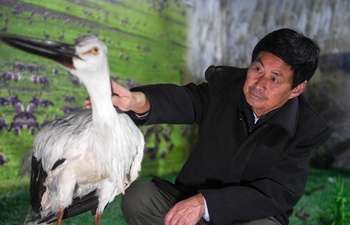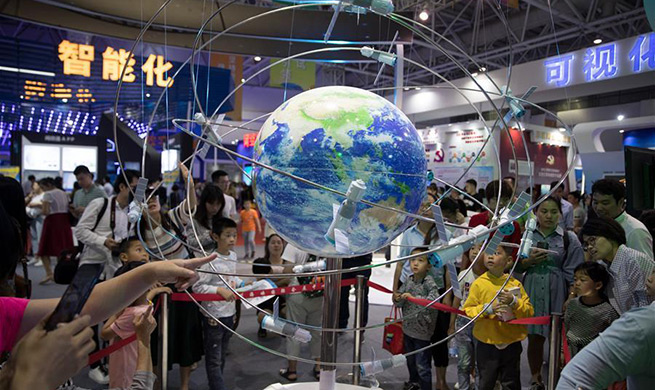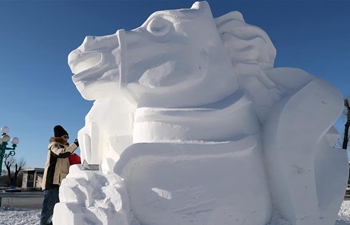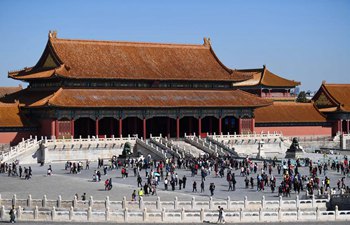by Xinhua writers Yuan Quan, Jia Zhao
BEIJING, Dec. 24 (Xinhua) -- A white-bearded British chemist became an overnight celebrity on China's social media. In just a few months, his chemistry experiments have attracted over two million followers.
David Evans, 60, is a chemistry professor at the Beijing University of Chemical Technology (BUCT). Tall and paunchy, he always wears a long white lab coat, a pair of safety goggles and a smile on his face before the camera. Some web users say he looks just like the "grandpa of KFC."
Evans has posted videos of various experiments: a bottle of liquid in his hand changes color from yellow to red and then to green as he shakes it; bubbles spray up from a flask and hit the ceiling after he mixes two liquids; he takes a huge breath of gas from a balloon and his voice sounds like Donald Duck.
His most popular experiments have attracted millions of hits on video-sharing apps. Cheers and shouts of excited children can be heard on his videos.
"I hope my experiments can ignite people's interest in science," says Evans.
The British chemist, who brings so many surprises and joy to his audience, is constantly surprised at the rapid development of China.
Evans has been interested in China since childhood. In the early 1970s, before reform and opening-up, China for him was a "country full of mysteries".
He subscribed to the magazine Beijing Review, from which he learned of China's political events, archaeological discoveries as well as cultural heritage.
Evans found he was drawn to a country very different from Britain. "I wanted to learn more about China, just as I wanted to learn more about chemistry."
After undergraduate and postgraduate studies at Oxford University, Evans became a chemistry professor in the University of Exeter. In 1987, he was invited to attend a chemistry conference in Nanjing, Jiangsu Province, and came to China's mainland for the first time.
Unexpectedly, the first Chinese phrase he learned was not "nihao" (hello) or "xiexie" (thank you), but "meiyou" (we don't have it). At that time, most parts of China still suffered from poverty, and people struggled for food. Even in cities, restaurants closed early and salespersons in shops generally replied with "meiyou."
Evans was also surprised to find that the TV advertisements were all about machines and factories, rather than daily commodities.
Evans began to learn Chinese, and every year since then, he visited China. During his visits, he witnessed huge changes happening in the country: the emergence of tall buildings, cars and a population growing richer. He grew more and more fond of the country and its people. In 1996, he quit his job in the UK and settled in Beijing.
Many of his friends thought he was crazy, but Evans said they just saw the difficulties but ignored the great potential of China.
He was employed as a teacher and researcher at BUCT. He traveled to many cities and was invited to friends' rural hometowns for the Spring Festival every year. Despite the limited conditions, villagers received him warmly and generously.
Evans hoped that the research he participated in could help Chinese people out of poverty. In one research project, he and his Chinese colleagues designed a new additive for plastic film that can improve the insulation of greenhouses, thus reducing the use of coal.
He was also involved in developing new flame-retardant materials that can make electric cables safer and reduce the density of smoke in the case of fire, thus giving people more time to escape.
Because of his contributions, in 2008, Evans became the president of the Beijing Local Section of the Royal Society of Chemistry (RSC); in 2005, he received the China International Science and Technology Cooperation Award, the only scientific and technological award for foreigners at a national level.
Three years later, in Britain, Evans received the Order of the British Empire, presented by Prince Charles.
His British friends started to recognize his vision and asked him to help contact Chinese researchers for cooperation.
China's scientific and technological progress earned similar recognition. For example, the research team where Evans works now has advanced equipment that is worth tens of millions of dollars in their state key lab, which, two decades ago, was just a rudimentary facility. The team has grown from a few people to over a hundred.
"In the past, people thought foreigners were here to help China, but now, scientific and technological cooperation between China and Britain is complementary and fully two-way," Evans said, adding that China has many advantages that Britain does not have. He is now helping promote a joint research project between China, Britain and Thailand.
In the past 22 years since he moved to Beijing, Evans has taught himself fluent Chinese, developed an appetite for spicy cuisine and an interest in hutong culture.
Recently, he began a new cause -- science popularization.
A decade ago, when he first presented an experiment show for a middle school, he found that the students were amazed, and it seemed as if they had never seen an experiment before.
Evans learned that Chinese students, even those in big cities, have fewer chances to do experiments than those in Britain. Learning chemistry becomes boring, as lessons involve memorizing the periodic table, theories and equations while cramming for tests.
"However, the fun of chemistry is doing experiments," says Evans.
In 2011, to mark the International Year of Chemistry, the RSC gave every Local Section 1,000 British pounds to promote chemistry in an imaginative way. Evans used the grant to set up "Fun with Science," a program of practical chemistry classes in primary schools for migrant children in the Beijing suburbs, which he delivered together with his graduate students. The excitement he saw in the children's eyes reminded Evans of himself as a little boy.
More recently, Evans has turned to the Internet as a platform for science popularization. When he learned that short video apps are also very popular in small cities and rural areas, he realized that it would enable more students, who do not have an opportunity in school or elsewhere, to enjoy the fun of experiments.
However, the work is never easy -- a one-minute video demands careful preparation and a lot of cleaning up, and he is always drenched with sweat.
But he never gets bored, believing that it is a scientist's responsibility to popularize science.
In primary and high schools, his experiments always fill lecture rooms with laughter. He likes to tell jokes and use metaphors. For example, he will compare catalyst to China's Good Samaritan Lei Feng, a flask spewing smoke to Aladdin's lamp, and huge mounds of bubbles to elephant's toothpaste.
In recent years, many public figures and commercial organizations have started working on science popularization through social media, but Evans thinks a scientist's advantage lies in his years of hands-on research.
He said British scientist Michael Faraday taught science in the community. "Now I want to do the same."
Some viewers called him "a Harry Potter-like magician," but Evans doesn't like the comparison, as "a magician never tells the secrets behind his tricks, but a scientist always gives an explanation."
He just sees himself as a teacher, and the purpose of doing experiments is to spread knowledge, inspire thinking, remove misunderstandings and rumors, and show that science can make a change.
At 60, Evans has no intention of resting. His university has just built a science classroom for him in a building full of key laboratories. He has also been invited to join a science popularization association initiated by senior researchers across the country.
Evans says he is looking forward to more "chemical reactions" with China.

















